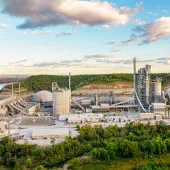Aggregate Industries provide an industry perspective

Company discusses the challenges of a low-carbon transition at University of Bath research seminar
AGGREGATE Industries visited the University of Bath this month to talk to postgraduate students and academic staff in the Department of Architecture and Civil Engineering about the practical challenges of a low-carbon transition for the construction industry.
Veronika Elfmarkova, ECOPact product manager for Aggregate Industries’ London Concrete business, was invited by Dr Xinyuan Ke, lecturer in sustainable materials for construction in the Department for Architecture and Civil Engineering, to provide postgraduate students and research and academic staff at the university with a view from industry.
The seminar provided an introduction to the sector, the cement production process, what net zero means for construction, and the opportunities for carbon reduction. Also discussed were some of the practical considerations of a low-carbon transition and how academia can help the sector in overcoming some of the challenges.
Ms Elfmarkova (pictured) commented: ‘Talking to the postgraduate students, who are at the very start of their journey into the construction industry, was a real honour. As an employer, we have a responsibility to support grassroots talent coming into the sector, so opportunities like this to start a conversation are vital. As a sector, if we are to deliver on our collective ambitions for a more sustainable future, upskilling is crucial, and for that there must be greater collaboration between academia and industry.
‘There is no single solution available to achieve carbon neutrality in construction, but research suggests that a combination of several initiatives can be implemented to reduce CO2 emissions across the industry value chain, including energy-efficient processes, a move to alternative fuels, reducing the clinker factor with alternative materials such as fly ash or GGBS, and novel cement and innovative carbon-capture technologies.’
She continued: ‘Aggregate Industries became the first construction materials supplier to be certified to PAS 2080, the world’s first specification for managing whole-life carbon infrastructure. We have sector-leading logistics – by ship, rail, or barge – and we can move our products to market unlike any other in our industry, whilst reducing truck movements on the roads and carbon output.
‘Furthermore, we continue to develop low-carbon solutions, and we have been reducing carbon in our concrete for years. We have converted to lower-carbon blended cements, which save over 30% carbon compared with the more traditional CEM1 mixes. This change towards lower carbon mixes is saving over 1.2 million kg of carbon per year. This is equivalent to over 4.8 million miles driven in a diesel car.’
Dr Xinyuan Ke, commented: ‘Sustainability improvement, technology, and strategy development that can help support decarbonization of the construction industry have always been the core research ambitions of my research group, as well as the strategic priorities of our department.
‘Close engagement and communication with the leading industrial experts and companies in the construction sector will pose sustained impacts and benefits to the learning, research, and career progression of our students and research staff.’









